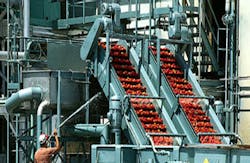The demand for food processing machinery is growing and sales are predicted to increase by 7.3 percent on a global scale over five years, reaching a total value of $53.3 billion, a recent study from industry marketing research firm Freedonia Group suggests.
According to the report, titled "World Food Processing Machinery," the rise in sales will be driven mainly by increased demand for processed food products in emerging and developing markets, as consumers' income goes up. Meanwhile, in major markets such as China and Brazil, it is a common tendency for consumers to shift their focus towards more value-added, non-essential food categories, such as chocolate and meat, which will result in food processing businesses looking for ways to diversify their production and to expand their capacity. In addition, producers from highly industrialized countries will be investing more in new methods of processing basic products, such as fruit, vegetables and grains, which will require more advanced equipment.
RELATED: Demand for processed food drives global food processing machinery, equipment market
Figures for 2011 show that industrial bakery machinery, including pasta equipment, accounts for almost one in five food processing machinery sales, which makes it the most popular product category. Predictions for 2016 confirm the dominance of bakery equipment, forecasting a bigger value growth compared to other categories. A significant increase is also expected in the sales of equipment for processing meat, poultry and seafood globally, as personal incomes are set to grow and consumers will be able to afford to buy more meat and related processed products, the research noted.
Asia and the Pacific region are predicted to see the fastest growth, at an annual average of 9.5 percent between 2011 and 2016, mostly because of the driving force of the Chinese market. Although sales in China leveled out between 2006 and 2011, the study expects a renewed surge in sales to be seen by 2016. India, Indonesia and Thailand are predicted to contribute to the region's strong food processing machinery sales.
The research noted that the subdued demand for industry machinery recorded in the most developed economies, including the United States, Western Europe, Australia, Canada and Japan, will continue to lag behind the global average over the next five years. The reason for this slow growth in more developed countries lies in the well established and relatively stable dietary preferences of consumers, which, combined with the maturity of the markets, allows little opportunity for growth and further development, the report claimed. However, countries recovering from the financial crisis might lead the way to innovation and invest in more advanced and upgraded machinery, which could boost sales in mature markets.
In terms of food processing machinery production, China will lead the way until 2016, followed by the United States, Germany and Japan. The experts note that the producers of the equipment are mainly small companies and the industry is very fragmented, which makes it difficult for major changes and a shift in the balance of power to take place.
